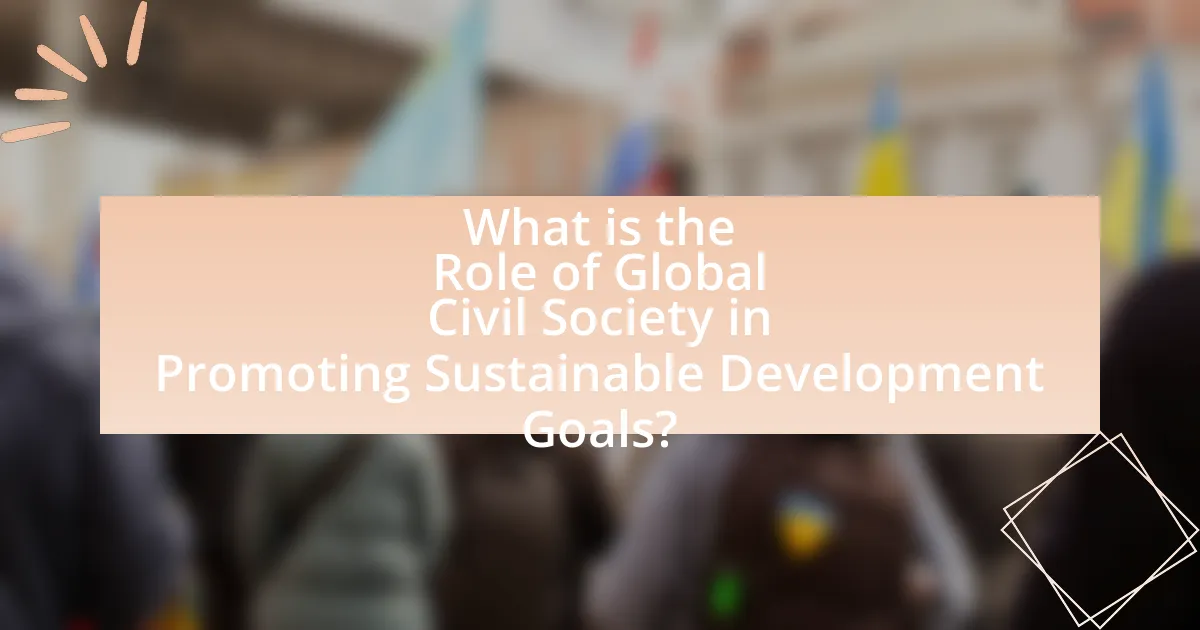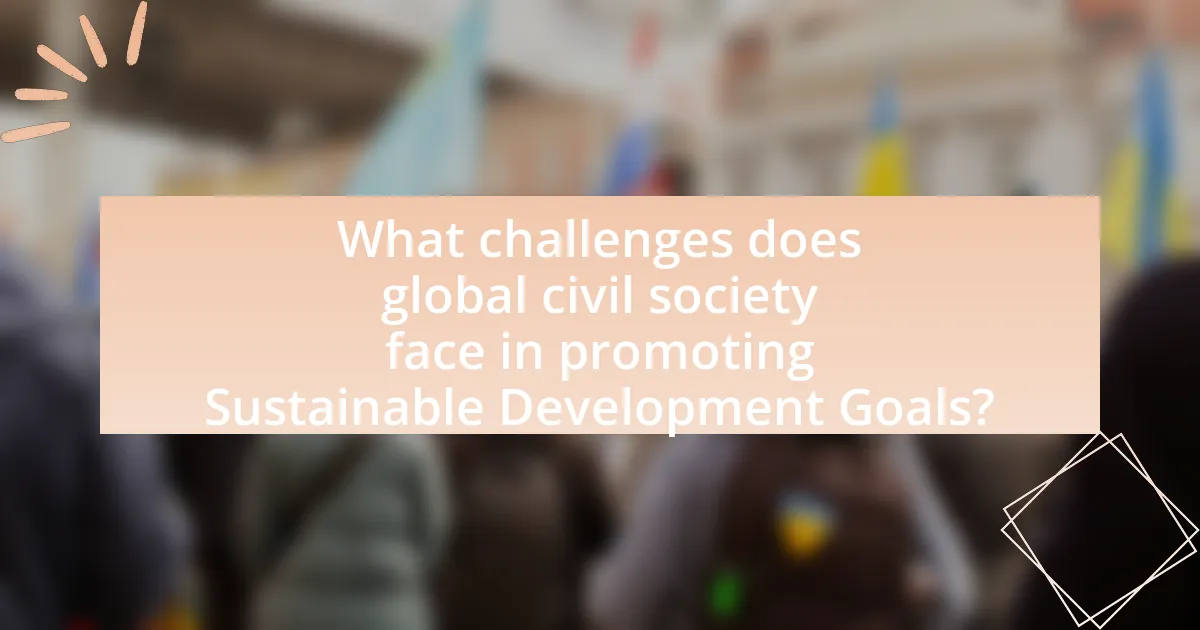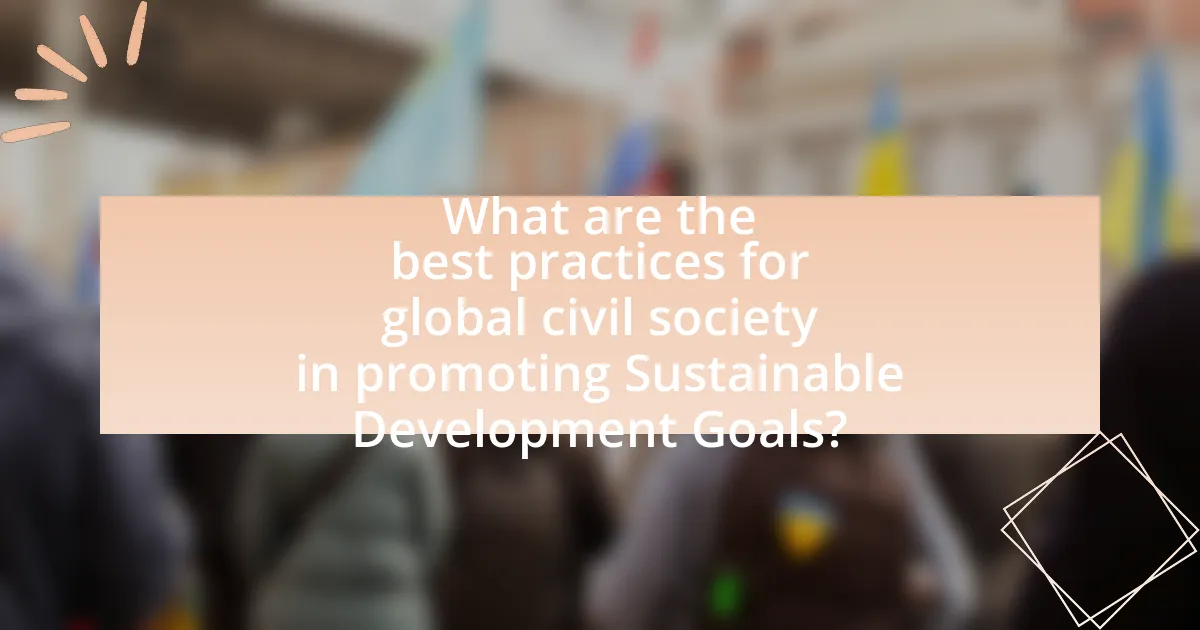Global civil society encompasses a diverse range of organizations, including non-governmental organizations (NGOs), grassroots movements, and advocacy groups, that play a vital role in promoting Sustainable Development Goals (SDGs). These entities advocate for policy changes, mobilize resources, and engage communities to ensure accountability and inclusivity in sustainable development efforts. The article explores how global civil society contributes to the SDGs through collaboration, advocacy, and monitoring, while also addressing the challenges faced, such as limited funding and political resistance. It highlights successful initiatives and best practices that demonstrate the effectiveness of civil society in driving progress towards achieving the SDGs.

What is the Role of Global Civil Society in Promoting Sustainable Development Goals?
Global civil society plays a crucial role in promoting Sustainable Development Goals (SDGs) by advocating for policy changes, mobilizing resources, and fostering community engagement. Organizations within global civil society, such as non-governmental organizations (NGOs), grassroots movements, and advocacy groups, actively influence governmental and institutional policies to align with the SDGs. For instance, the Global Goals Campaign, which unites various civil society organizations, has successfully raised awareness and driven action towards achieving the SDGs by engaging millions of people worldwide. Additionally, civil society acts as a watchdog, holding governments accountable for their commitments to sustainable development, thereby ensuring transparency and inclusivity in the implementation of the SDGs.
How does global civil society contribute to sustainable development?
Global civil society contributes to sustainable development by advocating for policy changes, mobilizing resources, and fostering community engagement. Organizations within global civil society, such as non-governmental organizations (NGOs) and grassroots movements, play a crucial role in raising awareness about sustainability issues and influencing governmental and corporate practices. For instance, the Global Reporting Initiative has established frameworks that encourage businesses to disclose their environmental impacts, promoting transparency and accountability. Additionally, civil society groups often collaborate with international bodies, such as the United Nations, to implement sustainable development initiatives, exemplified by their involvement in the Sustainable Development Goals (SDGs) framework. This collaboration ensures that diverse voices are heard, particularly those of marginalized communities, thereby enhancing the inclusivity and effectiveness of sustainable development efforts.
What are the key functions of global civil society in this context?
Global civil society plays a crucial role in promoting Sustainable Development Goals (SDGs) by advocating for policy changes, mobilizing resources, and fostering community engagement. These organizations, including non-governmental organizations (NGOs), grassroots movements, and social enterprises, work to raise awareness about the SDGs, influence governmental policies, and hold institutions accountable for their commitments. For instance, the Global Goals Campaign has successfully engaged millions in discussions about sustainability, demonstrating the capacity of civil society to drive public discourse and action. Additionally, global civil society facilitates partnerships among various stakeholders, including governments, businesses, and local communities, to implement sustainable practices effectively. This collaborative approach is essential for achieving the SDGs, as evidenced by initiatives like the UN’s Partnerships for the Goals, which rely on civil society’s involvement to create inclusive solutions.
How do these functions support the Sustainable Development Goals?
Global civil society functions support the Sustainable Development Goals (SDGs) by fostering collaboration, advocacy, and accountability among diverse stakeholders. These functions enable civil society organizations to mobilize resources, raise awareness, and influence policy decisions that align with the SDGs. For instance, research by the United Nations Development Programme highlights that civil society plays a crucial role in monitoring progress towards the SDGs, ensuring that marginalized voices are included in decision-making processes. This engagement enhances transparency and accountability, which are essential for achieving the SDGs effectively.
Why is global civil society important for achieving the Sustainable Development Goals?
Global civil society is crucial for achieving the Sustainable Development Goals (SDGs) because it fosters accountability, mobilizes resources, and amplifies marginalized voices. Civil society organizations, including non-governmental organizations (NGOs) and grassroots movements, play a key role in advocating for policy changes, ensuring government transparency, and engaging communities in sustainable practices. For instance, according to the United Nations Development Programme, civil society contributes to the implementation of the SDGs by promoting inclusive participation and holding governments accountable for their commitments. This engagement is essential for addressing inequalities and ensuring that the needs of all stakeholders are considered in the pursuit of sustainable development.
What unique perspectives does global civil society bring to the table?
Global civil society brings diverse perspectives that enhance the understanding and implementation of Sustainable Development Goals (SDGs). These perspectives include grassroots knowledge, advocacy for marginalized communities, and innovative solutions to complex global challenges. For instance, organizations like Oxfam and Amnesty International leverage local insights to inform global policies, ensuring that the voices of vulnerable populations are represented. Additionally, global civil society fosters collaboration across sectors, facilitating partnerships that drive sustainable practices and accountability. This multifaceted approach is crucial for addressing the interconnected nature of the SDGs, as evidenced by initiatives that integrate environmental, social, and economic dimensions in their strategies.
How does global civil society foster collaboration among stakeholders?
Global civil society fosters collaboration among stakeholders by creating networks that facilitate dialogue, share resources, and promote joint initiatives. These networks often include non-governmental organizations, community groups, and international organizations that work together to address common challenges, such as poverty and climate change. For instance, platforms like the Global Partnership for Sustainable Development Data bring together various stakeholders, including governments, private sector actors, and civil society organizations, to enhance data sharing and improve decision-making processes. This collaborative approach is essential for achieving the Sustainable Development Goals, as it leverages diverse expertise and resources, ensuring that multiple perspectives are considered in policy-making and implementation.

What challenges does global civil society face in promoting Sustainable Development Goals?
Global civil society faces significant challenges in promoting Sustainable Development Goals (SDGs), primarily due to limited funding and resources. Many civil society organizations rely on external funding, which can be inconsistent and often tied to specific agendas, hindering their ability to address local needs effectively. Additionally, political resistance from governments can obstruct advocacy efforts, as some states view civil society as a threat to their authority. Furthermore, the fragmentation of civil society, with numerous organizations working independently, can lead to inefficiencies and diluted impact. According to the United Nations Development Programme, only 0.2% of global philanthropic funding is directed towards SDGs, highlighting the financial constraints faced by these organizations.
What are the main obstacles to effective engagement by global civil society?
The main obstacles to effective engagement by global civil society include limited access to decision-making processes, lack of funding, and restrictive governmental policies. Limited access to decision-making processes hinders civil society organizations from influencing policies that affect their communities, as seen in the 2019 UN report highlighting the exclusion of civil society from key negotiations. Lack of funding restricts the capacity of these organizations to operate and implement programs, with a 2020 study by the Global Fund for Community Foundations indicating that 70% of grassroots organizations struggle to secure adequate financial resources. Additionally, restrictive governmental policies, such as those implemented in various countries that limit the freedom of assembly and expression, further impede the ability of civil society to engage effectively, as documented by Human Rights Watch in their annual reports.
How do political and economic factors impact global civil society’s efforts?
Political and economic factors significantly influence global civil society’s efforts by shaping the regulatory environment and resource availability. Political stability or instability can either facilitate or hinder civil society organizations’ operations, as seen in countries with restrictive laws that limit freedom of assembly and expression, which directly impacts advocacy for sustainable development goals. Economically, funding availability affects the capacity of these organizations to implement projects; for instance, during economic downturns, donor funding often decreases, limiting the ability of civil society to engage in initiatives aimed at promoting sustainability. Furthermore, economic policies that prioritize certain sectors over others can lead to unequal resource distribution, affecting the focus and effectiveness of civil society efforts in addressing global challenges.
What role does public perception play in the effectiveness of global civil society?
Public perception significantly influences the effectiveness of global civil society by shaping its legitimacy, funding, and engagement levels. When the public views civil society organizations as credible and aligned with their values, these organizations are more likely to receive support, both financially and in terms of volunteer engagement. For instance, a 2020 survey by the Global Civil Society Index indicated that organizations perceived positively by the public reported a 30% increase in donations compared to those with negative perceptions. This correlation underscores how public sentiment directly impacts the operational capacity and outreach of civil society initiatives aimed at promoting Sustainable Development Goals.
How can global civil society overcome these challenges?
Global civil society can overcome challenges by fostering collaboration among diverse stakeholders, including governments, businesses, and local communities. This collaborative approach enables the pooling of resources, knowledge, and expertise, which is essential for addressing complex issues related to sustainable development. For instance, initiatives like the Global Partnership for Sustainable Development Data demonstrate how partnerships can enhance data collection and sharing, leading to more informed decision-making. Furthermore, advocacy efforts by organizations such as Amnesty International and Oxfam have successfully influenced policy changes at national and international levels, showcasing the power of collective action in driving progress toward the Sustainable Development Goals.
What strategies can be employed to enhance advocacy efforts?
To enhance advocacy efforts, organizations can employ strategies such as building coalitions, utilizing social media, and engaging in grassroots mobilization. Building coalitions allows diverse groups to unite around common goals, increasing influence and reach; for instance, the Global Partnership for Education has successfully mobilized various stakeholders to advocate for education funding. Utilizing social media platforms enables organizations to disseminate information rapidly and engage with a broader audience, as seen in campaigns like #MeToo, which raised awareness on sexual harassment globally. Grassroots mobilization empowers local communities to advocate for their needs, exemplified by the Fridays for Future movement, which has effectively mobilized youth worldwide to demand climate action. These strategies collectively strengthen advocacy efforts by amplifying voices, fostering collaboration, and driving public engagement.
How can partnerships with other sectors strengthen global civil society’s impact?
Partnerships with other sectors can significantly strengthen global civil society’s impact by leveraging diverse resources, expertise, and networks to address complex social issues. For instance, collaborations between civil society organizations and the private sector can enhance funding opportunities and innovation, as seen in initiatives like the Global Partnership for Sustainable Development Data, which unites governments, businesses, and civil society to improve data collection and usage for sustainable development. Additionally, partnerships with academic institutions can provide research support and evidence-based strategies, further amplifying the effectiveness of civil society initiatives. These collaborations enable a more holistic approach to tackling challenges, ultimately leading to greater progress toward the Sustainable Development Goals.

What are the best practices for global civil society in promoting Sustainable Development Goals?
Global civil society can effectively promote Sustainable Development Goals (SDGs) by engaging in advocacy, fostering partnerships, and ensuring accountability. Advocacy efforts should focus on raising awareness and influencing policy at local, national, and international levels, as evidenced by organizations like Oxfam, which successfully campaigned for poverty reduction policies that align with SDGs. Partnerships with governments, businesses, and other stakeholders enhance resource mobilization and knowledge sharing, exemplified by the Global Partnership for Sustainable Development Data, which collaborates to improve data availability for informed decision-making. Additionally, civil society organizations must hold governments accountable through monitoring and reporting mechanisms, as demonstrated by the work of Transparency International in promoting anti-corruption measures that support SDG implementation.
What successful examples exist of global civil society initiatives?
Successful examples of global civil society initiatives include the Global Fund to Fight AIDS, Tuberculosis and Malaria, which has mobilized over $45 billion since its inception in 2002 to combat these diseases in more than 100 countries. Another example is the International Campaign to Ban Landmines, which played a crucial role in the adoption of the Mine Ban Treaty in 1997, leading to the elimination of millions of landmines worldwide. Additionally, the Fair Trade movement has empowered millions of farmers and workers in developing countries by promoting equitable trade practices, significantly improving their livelihoods. These initiatives demonstrate the effectiveness of global civil society in addressing critical issues and advancing sustainable development goals.
How have these initiatives influenced policy changes?
Global civil society initiatives have significantly influenced policy changes by advocating for the integration of Sustainable Development Goals (SDGs) into national and international frameworks. These initiatives mobilize grassroots support, raise awareness, and provide evidence-based recommendations that shape governmental policies. For instance, the 2015 Paris Agreement on climate change was heavily influenced by civil society organizations that highlighted the urgency of climate action, leading to commitments from countries to reduce greenhouse gas emissions. Additionally, reports from organizations like the United Nations Development Programme demonstrate that civil society engagement has led to the inclusion of marginalized voices in policy discussions, ensuring that policies are more inclusive and equitable.
What lessons can be learned from these successful examples?
Successful examples of global civil society in promoting Sustainable Development Goals (SDGs) demonstrate the importance of collaboration, community engagement, and advocacy. These lessons highlight that effective partnerships between governments, NGOs, and local communities can lead to innovative solutions and greater impact. For instance, the collaboration between the United Nations and various civil society organizations has resulted in increased awareness and mobilization around issues like climate action and gender equality, showcasing that collective efforts can drive significant progress towards achieving SDGs.
How can global civil society effectively measure its impact on Sustainable Development Goals?
Global civil society can effectively measure its impact on Sustainable Development Goals (SDGs) by utilizing a combination of quantitative and qualitative metrics, including data collection, stakeholder feedback, and case studies. Quantitative metrics can involve tracking specific indicators related to each SDG, such as poverty rates, education levels, and health outcomes, which are often reported by organizations like the United Nations. Qualitative metrics can include gathering testimonials and narratives from communities affected by civil society initiatives, providing context to the numerical data. For instance, the Global Reporting Initiative offers frameworks that help organizations align their reporting with SDG targets, ensuring that the impact is not only measured but also communicated effectively. This dual approach allows global civil society to present a comprehensive picture of its contributions to the SDGs, demonstrating accountability and fostering transparency.
What metrics are useful for assessing the contributions of global civil society?
Useful metrics for assessing the contributions of global civil society include the number of active organizations, the diversity of stakeholders involved, funding levels, and the impact of initiatives on local communities. The number of active organizations reflects the engagement and mobilization of civil society, while stakeholder diversity indicates inclusivity and representation. Funding levels provide insight into resource allocation and sustainability, and the impact of initiatives can be measured through qualitative assessments and quantitative data, such as improvements in health, education, and environmental conditions. These metrics collectively offer a comprehensive view of how global civil society contributes to the achievement of Sustainable Development Goals.
How can data collection and analysis improve future initiatives?
Data collection and analysis can significantly enhance future initiatives by providing evidence-based insights that inform decision-making and strategy development. For instance, organizations that systematically gather and analyze data on community needs and resource availability can tailor their programs to address specific gaps, leading to more effective interventions. A study by the World Bank found that data-driven approaches in development projects increased project success rates by up to 30%, demonstrating the tangible benefits of informed planning. Furthermore, continuous data analysis allows for real-time adjustments to initiatives, ensuring they remain relevant and impactful in achieving Sustainable Development Goals.
What practical steps can global civil society take to enhance its role in promoting Sustainable Development Goals?
Global civil society can enhance its role in promoting Sustainable Development Goals (SDGs) by actively engaging in advocacy, fostering partnerships, and mobilizing resources. Advocacy efforts can include raising awareness about the SDGs through campaigns and educational initiatives, which can lead to increased public support and pressure on governments to implement policies aligned with the SDGs. For instance, organizations like Oxfam and Greenpeace have successfully influenced policy changes by mobilizing grassroots movements and leveraging social media platforms.
Additionally, fostering partnerships among various stakeholders, including governments, businesses, and other civil society organizations, can create synergies that amplify efforts towards achieving the SDGs. Collaborative initiatives, such as the Global Partnership for Sustainable Development Data, demonstrate how shared resources and expertise can lead to more effective solutions.
Mobilizing resources is also crucial; civil society can seek funding from international donors, philanthropic organizations, and private sector investments to support projects that directly contribute to the SDGs. According to the United Nations, an estimated $3.9 trillion is needed annually to achieve the SDGs by 2030, highlighting the importance of resource mobilization.
By implementing these practical steps, global civil society can significantly enhance its impact on promoting and achieving the Sustainable Development Goals.